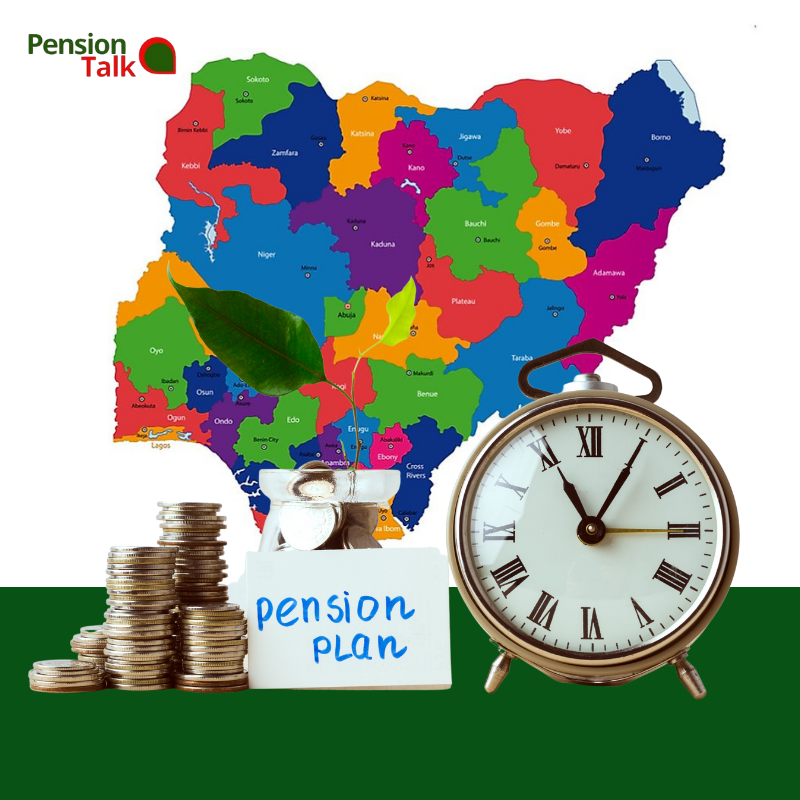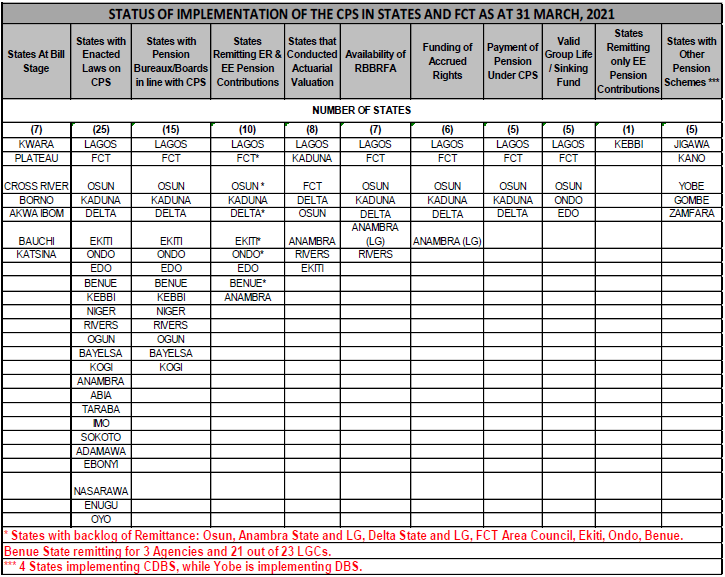
Pension payments at the sub-national level in Nigeria are horrible, to say the least. Many states in Nigeria are struggling to meet up with huge pension liabilities which are overdue.
A lot of the states have serious financial crises that, over the years have not been well managed. This in turn has sprouted to become nightmares for successive governments one after the other.
Nigeria at the sub-national level practices the Defined Benefits Scheme (DBS) mostly and this entails that every worker who has worked for the government for a qualifying period will be entitled to some form of gratuity and life pension at retirement.
As lofty as this sounds, and of course evidenced by what is obtainable in other climes, Nigeria’s situation makes it look like an impossible and difficult task.
There’s hardly any state in Nigeria that is up-to-date with all retirement benefits payments for their retired state workers. In fact, there is none!
Just a few days ago, retirees in Ogun state stormed the state secretariat demanding that the state pay their outstanding retirement benefits some as old as 10 years.
In the same vein, retirees in Kano are also demanding from the state the payment of over 5 years of outstanding retirement benefits.
Every now and then, you hear news and stories of retirees from different states across the country demanding for what, at first, is their automatic right now turned privilege.
In a recent report in July by the Vanguard newspaper, about 22 states are owing over N300 billion to their workers as retirement benefits. This trend is continuing and it is becoming alarming and worrisome by the day.
How Do We Get Out Of This Mess?
Unfortunately, there are no easy answers to this lingering question. Financially, most of the states are not viable. Some of these states cannot even pay salaries and wages of workers that are still in service, talk less of retired workers.
The birth of the Contributory Pension Scheme (CPS) in the country would have helped solved this problem early enough preventing us from getting to the sorry state that we find ourselves now if it has been properly implemented with the political will that it requires.
The CPS would have eliminated the backlog of outstanding payments that are currently being witnessed under the Defined Benefit Scheme (DBS) that most states still practice. Even with the innovative introduction of the Contributory DBS (CDBS) by some states, the problem still persists.
Some of the major reasons that have been identified as the cause of the implementation failure of CPS in most states can be attributed to the following:
- Lack of political will of state government to implement the CPS
- Overbloated workforce at the state level
- Corruption
- Unfavourable economic realities
Will The CPS Save The Day?
The following table shows the status of implementation of the CPS by all states in the country as at the latest report released by the National Pension Commission (PenCom).

The table reveals, unfortunately, that only a handful of states are implementing the CPS as they should. This explains why we have a myriad of pension problems across the country.
In 2006, Niger State, for example, passed a law on the CPS. The CPS was halted in April 2015, however, the law was revised in 2017 to lengthen the transition period and exempt some employees from the CPS. In June 2020, the state began deductions of 10.5 percent for employer pension contributions and 7.5 percent for employee pension contributions, although only for June and July 2020. Employer and employee pension contributions are currently deducted but not remitted to employee RSAs.
On the other hand, Kebbi State has implemented a CPS law and is only remitting 7.5 percent of employee pension contributions.
Ogun state established a CPS law, deducting 7.5 percent for the employer and 7.5 percent for employee pension contributions, but has not remitted the funds since 2015.
For state employees, Anambra remitted employer pension contributions until December 2017 and employee pension contributions until August 2020. It remitted employer and employee pension payments for local government employees up until August 2018.
Meanwhile, as required by the Pension Act, some states run their own pension schemes.
Jigawa State, for example, passed a law on the Contributory Defined Benefit Scheme, or CDBS, in 2005 and revised it in 2015. It is remitting 17% of employer pension contributions and 8% of employee pension contributions. Employee and employer pension contributions for December 2020 to March 2021 were remitted by the state, however, the backlog of employee and employer pension contributions for May 2020 to November 2020 has yet to be remitted.
Yobe state is operating the Defined Benefit Scheme, DBS. However, a Committee has been inaugurated on the adoption of the CPS in February 2020. Kano enacted a law on the CDBS in 2006 and implementing the scheme.
The economic realities of the day all point to the fact that successive state governments cannot continue to carry on business as usual. The annual wage bill keeps increasing at a rate above the revenue growth. This in turn affects the settlements of these retirement obligations as funds will also need to be diverted to other important projects in the state.
While this is the common-sense thing to do, it is also not being just and fair to the retirees who have done their own part of the deal by working for the state only to be denied their rightfully earned benefits.
This, therefore, brings us to the question of what is the right model to solve this problem or get out of it.
As of today, the CPS remains the only viable means to achieve zero delays in pension benefits.
The CPS with its pay-as-you-go (PAYG) feature puts the burden off the government immediately after the monthly remittance was made while the worker is in service. So at retirement, the workers will be receiving his/her pensions from an appointed licensed Pension Fund Administrator (PFA).
State governments must rise to the occasion and tackle this regrettable challenge head-on with the right machinery put in place.
They should pay off outstanding obligations while continuing to settle the present one. To do this successfully they will need to tinker with their finances and see where savings can be made from one part and divert to settling pension liabilities. They should cut-cost where necessary.
Also, they will need to up their revenue-driven game to enable them to meet up with their pension obligations due.
The elephant in the room, which is also corruption, should be dealt with decisively and not with kid gloves.
These are no mean decisions to make and agreeably, they are not easy but they can be done with the right political will.
States must begin to treat their retired workers with dignity and honour. Retirees deserve the best life after work having served diligently for the most part of their active life working for you.
